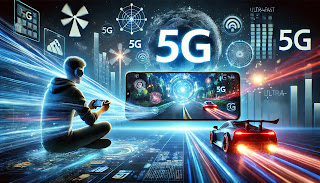The advent of 5G technology is set to revolutionize the mobile gaming landscape,
offering unprecedented speeds, lower latency, and improved connectivity. As mobile
games become more complex and immersive, the capabilities of 5G will allow developers
to create richer, more engaging experiences for players. In this article, we will explore
how 5G is transforming mobile gaming and what this means for game development
companies and game studios.
Enhanced Speed and Performance
One of the most significant advantages of 5G technology is its ability to provide lightning
-fast data transfer speeds, which can reach up to 10 Gbps. This increase in speed
enables mobile games to load faster and run more smoothly, enhancing the overall user
experience. Players will no longer experience frustrating lag times or slow downloads,
allowing them to immerse themselves in gameplay without interruptions.
For game development companies, this means that they can design more complex
games with high-quality graphics and detailed environments, knowing that players
will have the bandwidth to support these advancements. Game studios can incorporate
richer textures, larger worlds, and more dynamic gameplay elements without worrying
about performance limitations.
Lower Latency
Latency, or the delay between a player's action and the game's response, is a critical
factor in mobile gaming. With 5G, latency can be reduced to as low as 1 millisecond.
This near-instantaneous response time is essential for competitive gaming, where
every millisecond counts.
Reduced latency enhances the gameplay experience, making games more responsive
and fluid. This improvement is particularly beneficial for fast-paced genres such as
first-person shooters (FPS) and multiplayer online battle arenas (MOBAs). For
game studios focusing on competitive titles, leveraging 5G technology can provide a
significant advantage, allowing them to create games that feel more intuitive and
engaging.
Seamless Multiplayer Experiences
5G technology enables smoother and more reliable multiplayer experiences, allowing
players to connect and compete without interruptions. The increased bandwidth
and reduced latency will facilitate real-time interactions between players, making
cooperative and competitive gameplay more enjoyable.
Game development companies can take advantage of this enhanced connectivity
to design games that incorporate advanced multiplayer features, such as larger
player counts, more intricate matchmaking systems, and persistent online worlds.
As a result, game studios can create experiences that foster community and
collaboration, leading to increased player retention and satisfaction.
Cloud Gaming and Streaming
The rise of cloud gaming services, such as Google Stadia and NVIDIA GeForce NOW,
is another area where 5G will profoundly impact. With its high-speed connectivity,
5G will enable players to stream high-quality games directly to their mobile devices
without expensive hardware.
This shift towards cloud gaming opens new avenues for game development companies
and game studios. They can focus on creating games that are optimized for streaming,
ensuring that they deliver high-quality visuals and performance even on lower-end
devices. Additionally, the accessibility of cloud gaming can reach a broader audience,
allowing players with varying device capabilities to enjoy cutting-edge gaming experiences.
Immersive Experiences with Augmented and
Virtual Reality
5G technology will also enhance the potential for augmented reality (AR) and virtual
reality (VR) in mobile gaming. The increased data transfer speeds and lower latency
will allow for more immersive experiences where players can interact with their
environments in real-time.
For game studios specializing in AR and VR, the implications of 5G are significant.
They can create more complex and interactive environments where players can
seamlessly transition between the virtual and real worlds. This technology enables
developers to push the boundaries of creativity and innovation, leading to unique
gaming experiences that were previously unattainable.
Conclusion
The impact of 5G on mobile gaming experiences is profound and far-reaching. With
enhanced speed, lower latency, seamless multiplayer capabilities, and the potential for
cloud gaming and immersive technologies, game development companies and game
studios have exciting opportunities to innovate and elevate their offerings. As 5G
technology continues to roll out globally, the future of mobile gaming looks brighter than
ever, promising a new era of immersive and engaging gameplay experiences that will
redefine how players interact with their favorite games.
Staying ahead of the curve will be essential for game developers in this rapidly evolving
landscape. By embracing 5G and its capabilities, they can create the next generation
of mobile games that captivate players and set new industry standards.

.jpg)

.jpg)
No comments:
Post a Comment